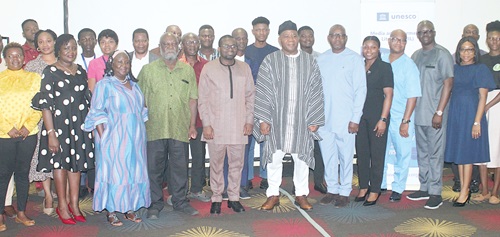A communications lecturer and consultant, Professor Kwame Karikari, has called on the nation’s political class to take decisive action towards the passage of a comprehensive Broadcasting Law that reflects current technological realities to serve the public interest.
He said in spite of the growing importance and complexity of the media landscape, expanding from a single state broadcaster to nearly 600 radio stations, previous governments had continually failed to prioritise the legislation.
Speaking at a consultative meeting on the Broadcasting Bill in Accra, Prof. Karikari attributed the delay largely to the political sensitivities surrounding media regulation in a democratic environment, adding that politicians were often wary of how the regulation might impact media freedom, which played a central role in shaping public opinion and democratic accountability.
Organised by the UNESCO Ghana Office, the meeting brought together representatives from the National Communications Authority (NCA), the National Media Commission (NMC), Ghana Independent Broadcasters Association (GIBA), the Ghana Journalists Association (GJA), as well as legal and academic experts who reviewed the bill and examined its possible impact on broadcasting in the country.
Politicisation
"The point I'm driving at is that the whole idea of a Broadcasting Law in this country does not seem to be a priority for any of the governments, which also indicates that when it comes to media policy, media regulation issues, it's very political," he said.
“Now, whatever it is, whatever happens to the bill, in my view, because it has travelled so long, and because technology has changed so drastically, almost a 360-degree development of the technology, it will require some very sensitive and very committed revisits of that bill so that it conforms to today's realities of the technology," Prof. Karikari said.
The former Chairman of the Graphic Communications Ltd Board also lamented the lack of adequate legal and regulatory support for community broadcasting, a key focus for the meeting.
He mentioned some of the challenges as misrepresentation by some proprietors who claim community status while operating commercially, and called for clear regulatory definitions.
Additionally, Prof. Karikari said while recent proposals to improve the Broadcasting Bill were welcome, issues persisted, especially regarding the financial and operational viability of community stations.
He, therefore, called for continued dialogue and reforms, stressing that without a committed push from stakeholders in the political class to pass the law, standards, ethics and benefits would continue to deteriorate.
Empowerment
The Country Representative and Head of UNESCO Accra Office, Edmond Moukala, said empowering community media was essential to achieving broader development goals, promoting public participation and preserving cultural, as well as linguistic diversity.
He underscored the crucial role of community broadcasting in fostering diversity, social cohesion and inclusive democracy through amplifying marginalised voices and supporting local development.
"As Ghana continues to advance its democratic and socio-economic development, the role of the media cannot be overstated. Broadcasting presents a historic opportunity to strengthen and regulate the media landscape, particularly by recognising and empowering community forecasting," Mr Moukala added.
Legal framework
A legal practitioner, Samson Lardy Anyenini, reflected on how Ghana’s rapidly changing media environment, especially the rise of new media had outpaced existing policies and legal frameworks, making the current terrain dangerous without updated and responsive regulation.
He said regulatory tensions persisted, especially between the NMC and NCA, over media control and oversight.
Mr Anyenini said that while the NMC sought broader powers, the NCA remained hesitant, although both institutions played key roles in media promotion and regulation under acts passed in 2008.
He further warned that without resolving such tensions and modernising regulations, media freedom and its democratic function would remain vulnerable, particularly for under-supported platforms such as community radio.

